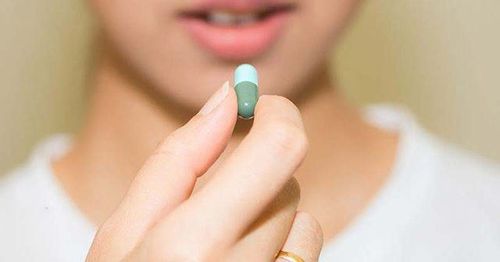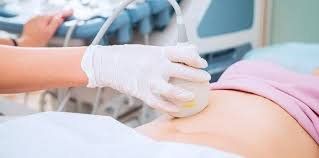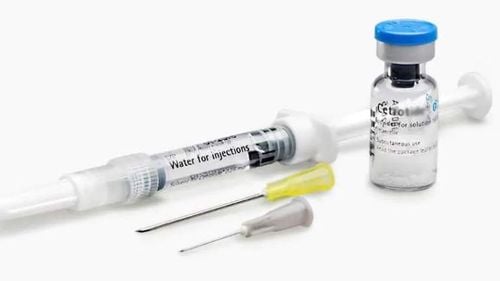This is an automatically translated article.
Hypothyroidism occurs when the thyroid gland reduces the production of thyroid hormone. Hypothyroidism and menopause share some of the same symptoms, making it easy to confuse them. Besides, hypothyroidism is also most common in middle-aged women and this is also the time when women are going through menopause.
1. Thyroid disease affects menstruation?
Estrogen levels drop significantly during menopause. This causes many of the symptoms associated with menopause. Estrogen levels can also affect thyroid function.
In a study done since 2011, researchers examined the role of estrogen levels on thyroid receptors. Thyroid receptors are molecules that allow thyroid hormone to enter cells. Researchers found that estrogen levels can affect thyroid function and lead to thyroid disorders. However, more research is needed to better understand the relationship between these two hormones.
Hypothyroidism (English name is hypothyroidism) can increase or worsen menopausal symptoms (English name is menopause). A research study done since 2007 found that women with thyroid disorders and severe menopause symptoms had improved symptoms after receiving treatment for their thyroid disorder. This suggests that treating a thyroid disorder can help manage menopausal symptoms.
Hypothyroidism and menopause also have many overlapping symptoms. Having both conditions can increase the risk and severity of overlapping symptoms.
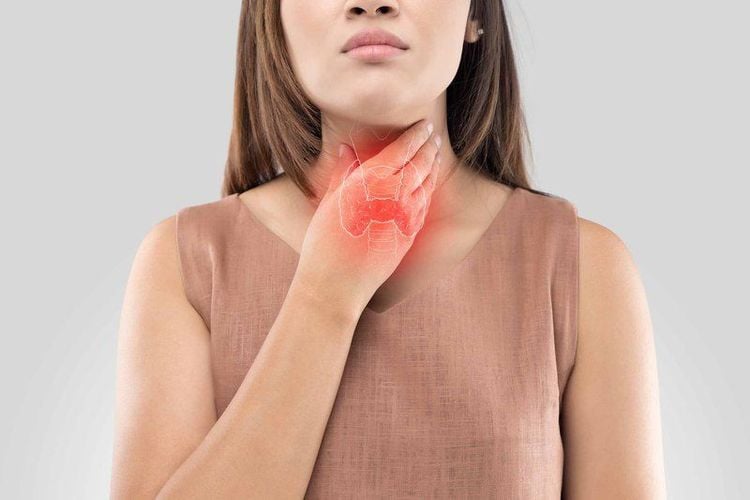
Suy giáp thường gặp ở phụ nữ trung tuổi
According to the American Association of Clinical Endocrinologists (AACE), millions of women with menopausal-like symptoms, even those taking estrogen, can develop thyroid disease without diagnosed. While symptoms like fatigue, depression, mood swings, and sleep disturbances are often associated with menopause, they can also be a sign of hypothyroidism.
A survey conducted by AACE found that only one in four women discussed menopause and its symptoms with their doctor and were also screened for thyroid disease. The thyroid gland plays a role in regulating the body's overall metabolism and affects the heart, brain, kidneys and reproductive system, along with muscle strength and appetite.
Although the issue of menopause needs to be addressed, it is also important to remember that the incidence of hypothyroidism increases with age and can coexist with other medical conditions.
As a patient, you should pay attention to the signs and symptoms of hypothyroidism and let your doctor know if you are concerned about your thyroid function.
If you are a woman who has experienced menopausal symptoms, do not hesitate to discuss them with your doctor. If you feel that symptoms persist despite appropriate treatment, it may be time to get your thyroid-stimulating hormone (TSH) levels checked.
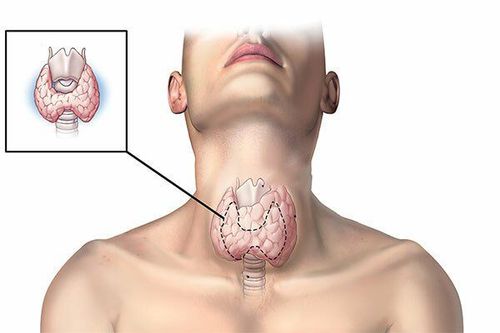
Tuyến giáp có vai trò rất quan trọng
2. Distinguishing symptoms between hypothyroidism and menopause
On average, menopause occurs at age 51 for women, and hypothyroidism can happen at any time. The following symptoms are commonly seen in menopause and hypothyroidism:
| Mãn kinh | Suy giáp |
| Bốc hỏa và đổ mồ hôi đêm | Tăng độ nhạy cảm với lạnh |
| Bất thường ở đường tiết niệu dưới, chẳng hạn như đi tiểu thường xuyên hoặc đi tiểu nhiều vào ban đêm | Nồng độ lipid trong máu cao, chẳng hạn như triglyceride và cholesterol |
| Giấc ngủ bị xáo trộn | Nhịp tim chậm |
| Gặp vấn đề tập trung và học tập | Trí nhớ kém |
| Thay đổi năng lượng hoặc cảm giác mệt mỏi | Mệt mỏi kéo dài hoặc cảm giác mệt mỏi |
| Thay đổi trọng lượng cơ thể, chẳng hạn như tăng cân đột ngột | Tăng mỡ trong cơ thể |
| Teo và khô âm hộ | Yếu cơ và khớp |
| Chấm dứt chu kỳ kinh nguyệt | Tóc mỏng |
| Thay đổi tâm trạng | Trầm cảm hoặc buồn bã |
| Khàn tiếng | |
| Da khô, nứt nẻ |
3. When to see a doctor?
Thyroid disorders can also increase the risk of long-term menopausal complications. One of the most common complications of menopause is osteoporosis, or loss of bone density. Research indicates that hypothyroidism can also reduce bone density. Caucasian women with low body fat are the group most at risk for osteoporosis.
Another common complication of menopause is an increased risk of cardiovascular diseases. Low thyroid hormone levels also increase the risk of heart disorders.
Talk to your doctor if you suspect a thyroid problem or if you experience severe menopause symptoms. When you see your doctor, be prepared with the following:
Symptoms, especially fatigue, hot flashes, weight changes and mood swings; The severity and duration of symptoms and whether they have gotten worse; Family history of endocrine disorders, especially related to thyroid disorders; Abnormalities in the menstrual cycle; Your eating habits. A doctor can perform diagnostic tests to determine if a woman is experiencing menopausal symptoms or if she has an underactive thyroid.
The doctor will ask questions about the symptoms, such as when the symptoms started, their severity and how long they persisted. In addition, the doctor will probably perform a physical exam and order some diagnostic tests.
Both menopause and decline can be diagnosed with a simple blood test, which includes the following:
Follicle-stimulating hormone (FSH) FSH is the hormone responsible for maturation and ovulation of an egg in the ovary. As women age, the body needs more FSH to perform this function. A persistently elevated FSH level, usually above 30 mIU/mL, is diagnostic of menopause.
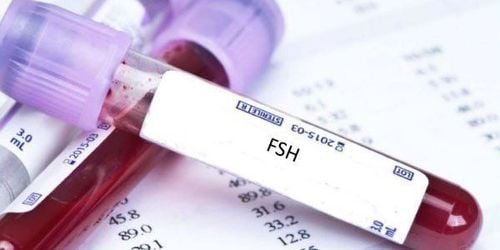
Xét nghiệm FSH giúp chẩn đoán thời kỳ mãn kinh chính xác
Luteinizing hormone (LH) LH is also continuously increased after menopause. A woman will have more LH in the middle of her menstrual cycle as a trigger for ovulation, so an elevated result on this test alone will not diagnose it with certainty. menopause or not.
Thyroid-stimulating hormone (TSH) A TSH level test is usually the first test that doctors will do to check how well the thyroid is working.
When the thyroid gland is not working correctly, the body produces TSH to stimulate the thyroid gland to produce thyroid hormone. High TSH levels can indicate hypothyroidism.
T3 and T4 These are the two main hormones that the thyroid gland produces. Although levels of these two hormones do not change significantly in cases of hypothyroidism, doctors do this test to rule out other thyroid problems.
Thyroid antibody testing The thyroid gland contains cellular proteins and sometimes the body makes antibodies against these proteins. If this happens, it can cause both hypothyroidism and hyperthyroidism.
If these antibodies are present in a person with hypothyroidism, the doctor will diagnose the person with Hashimoto's thyroiditis.
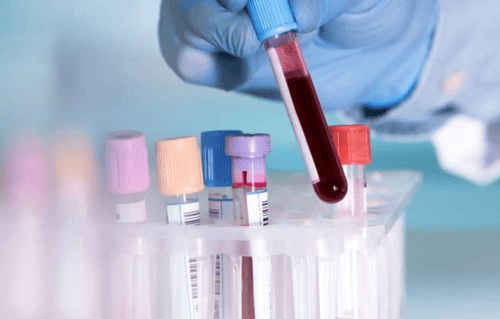
Xét nghiệm tự kháng thể tuyến giáp giúp xác định bệnh lý tuyến giáp chính xác
To detect thyroid abnormalities as well as determine if menopause has come or not, you should have regular health checkups. This will help to detect health problems early, get timely treatment, not only help protect health but also help reduce the cost of disease treatment, increase treatment efficiency because it is detected at an early stage. .
Currently, Vinmec International General Hospital has general health checkup packages suitable for each age, gender and individual needs of customers with a reasonable price policy, including:
Health checkup package Vip general health Standard general health checkup package Patient's examination results will be returned to your home. After receiving the results of the general health examination, if you detect diseases that require intensive examination and treatment, you can use services from other specialties at the Hospital with quality treatment and services. outstanding customer service.
Please dial HOTLINE for more information or register for an appointment HERE. Download MyVinmec app to make appointments faster and to manage your bookings easily.
References: webmd.com, healthline.com, medicalnewstoday.com





